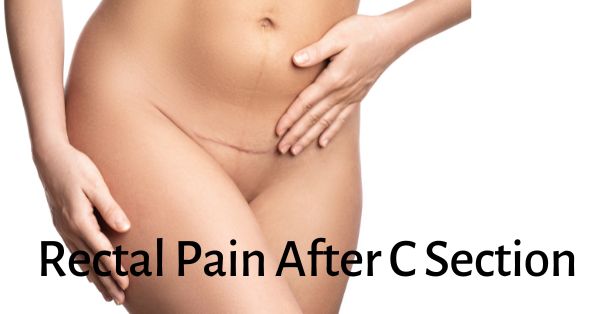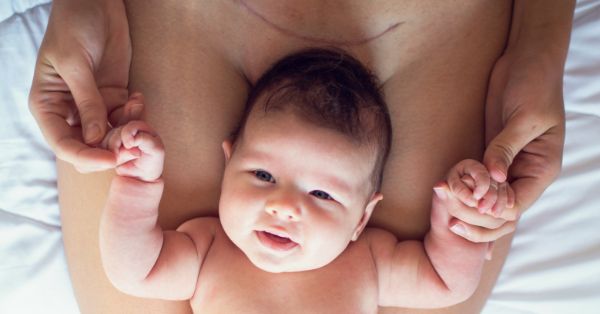Having a baby is no joke. Just thinking about the intense pain from contractions is making me wince. But what about when you have a c section? With the spinal block, the pain is described more as discomfort. It is the aftermath of recovery where you will find your pain, keep reading to understand all the information about rectal pain after c section.

Vaginal vs C Section
Being pregnant takes its toll on your body. Your ligaments and joints are under pressure for a long time. After delivery, this pressure lessens and hormones drop significantly. But having a c section is very different from having a vaginal delivery. You would expect the healing pain to be isolated to your incision site yet many moms complain about rectal pain after c section. So what is it about having a surgical birth that causes this pain in the butt?
Common Causes of Rectal Pain After Delivery
You won’t be the first or last woman to feel the pain that comes after a c section. I don’t mean recovery pain either. Even though having a c section is totally different from a vaginal birth you are still at risk from many similar afterpains.
Why Do Bowel Movements Hurt After C Section?
After delivering your baby your body is coming around from the anesthesia, and as you regain feeling in your legs and abdomen you begin to experience the after effects of birth. The one thing I was most petrified of was does pooping after a c section hurt?
It can be a few days before your bowel movements return to normal after surgery. It is extremely common for you to feel constipated, experience diarrhea, and be in pain from being full of trapped wind after all your body was just opened up so air is bound to be trapped inside!
Constipation is never a welcomed condition. You feel the urge to poop, and the pain in your bowel from the trapped wind is intense yet you have no joy. Pooping post surgery should come naturally and those who have had abdominal surgery should avoid straining. If you find yourself straining more than usual you are putting undue pressure on your fresh incision causing pain and other issues.
Next time you go to the loo take note of how many muscles you are using in your abdomen. You will be surprised! In fact, those are the exact muscles you will be straining if you try to poop while constipated.
After my delivery, I was so nervous! Sounds stupid now really, my body had just given birth to my amazing baby yet why was this first poop creating such havoc for me? After talking with my anesthetist she recommended waiting until the urge was real and she was right. With all the trapped wind going on I was so uncomfortable but when my body was ready I didn’t have to strain at all!
If you have gone a few days post surgery and you still have no pooping joy then you could take a laxative to help get things moving. Prune juice is also a great boost for the bowel, not that the taste has anything to go by!
Now we have a little insight into that first poop. Let’s look at other forms of rectal pain after c section.
‣‣‣ Hemorrhoids
Hemorrhoids are 100% the least glamorous stage of pregnancy and who knows there could have been times when a stranger(doctor) has had his hands inside you quite literally!
The fact is our bodies are put under so much strain and pressure that the hemorrhoidal veins in our anus swell this can either be internal or external.
☆ Symptoms
There are varying symptoms of having haemorrhoids, but if you are feeling anal pain after c section then you may want to consider this condition. Also look out for
- Blood in poop
- Pain when you use the loo
- Discomfort around the anus
- Mucus present after wiping
- Feeling the urge to go again after having a poop
★ Treatment
Thankfully you can treat hemorrhoids at home! No one wishes to return to their doctor after a c section about another problematic hole!
To ease the pain and discomfort try the following:
- Add fibre to your diet
- Hydrate as much as you can
- Avoid tea, coffee and sodas
- Warm baths
- Wipe properly
- Don’t hold it in or strain to go
- Cool pack to reduce swelling
If none of the above seem to be doing the trick then you can head to your pharmacy and seek out the following.
- Ointments and creams
- Stool softeners
- Suppositories
- Paracetamol (Avoid codeine)
- Laxatives
‣‣‣ Sciatica
Sciatica can be a real pain in the butt … and legs and back. To be fair to our bodies the uterus puts so much pressure on our nerves during pregnancy that post partum the relief of no longer bearing that weight can cause us pain and discomfort!
Two sciatic nerves run down through our lower back down to our bottoms and legs. Any type of pinching or pressure on these nerves can radiate a whole wave of pain.
☆ Symptoms
The following is an extensive list of what could be sciatica pain.
- Shooting, electric feeling in your back, bum and legs.
- Sore muscles
- Tingling
- Numbness
Thankfully sciatic pain is not deemed dangerous so again we can treat this symptom at home.
★ Treatment
Treatments for sciatica are as follows:
- Massage
- Heat/ cold therapy
- Yoga – providing your c section is healing nicely
- Simple stretches and exercises
‣‣‣ Piriformis Syndrome
Piriformis Syndrome occurs after spinal anesthesia. Obviously as undergoing c section surgery isn’t enough this can rear its ugly head! The piriform muscle can spasm and cramp after a spinal block. As this muscle is located in the buttock it is safe to say this could be the reason you are suffering from rectal pain after c section.
This muscle runs closely to the sciatic nerve so when this muscle contracts you can find that you have issues regarding sciatica as well.
☆ Symptoms
Many symptoms of Piriformis Syndrome double up with the sciatica symptoms but if you feel any of the following:
- Dull ache in your bottom
- Pain walking up or down stairs
- Increased pain after sitting
- Pain when moving hips
Symptoms are known to worsen after prolonged exercise or sitting in the same position.
★ Treatment
Treatment for this condition will be extensively stretching out the muscle.
You may also be advised to:
- Seek a physical therapist
- Cold and heat therapy
- Anti inflammatory medication
- Corticosteroid injections
- Use of a TENS machine
It is clear that if you are in pain after your c section that you could be suffering from any of the conditions mentioned above. Your first priority is healing after your surgery so take care and consider your limitations when seeking at home treatments. Obviously if you are really struggling then your doctor can advise you further.

What Can Your Doctor Do?
Of course, you have exhausted the list of treatments we have suggested above and still, you are not getting any relief from your rectal pain. It could be a good time to mention it to your doctor.
Now I know jumping back to hospital whilst your newborn is cuddled up looking good and cute is not the most favored option but at times the doctor’s will need to take a little more hands on approach.
Regarding haemorrhoids, you would be treated as an outpatient and could look into the following procedures.
- Rubber band ligation – sealing of the swollen glands.
- Sclerotherapy – injection to help them shrink.
- Hemorrhoidectomy- removal of haemorrhoids via surgery.
- Infrared Coagulation- infrared technology cuts the blood supply in the hope they shrink.
Sciatica when severe will require specialist treatment involving:
- Pain killing injections – botox or other steroid injections
- Decompression surgery – relieves the pinched nerve, not available to women who have recently had a c section.
Wrapping Up
I think it is fair to say that having a c section is no walk in the park yet the aftermath of how you feel is usually directed toward the incision site and how you are healing rather than rectal pain after c section.
Nevertheless, it is important to identify any discomfort that may be compromising your healing and bonding time with your new little arrival.
Whether it is Hemorrhoids, Sciatica or Piriformis Syndrome you may be suffering from, you can check out the successful at home treatment to help you on the road to recovery. Obviously if you are in extreme pain seek medical advice straight away.
Do not suffer in silence, help yourself get rid of the pain in your butt so you can concentrate on your beautiful family.
More to Read: